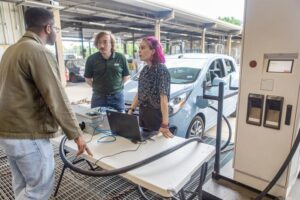DSIT to open second HQ in Salford
Department for Science, Innovation and Technology and Building Digital UK plan to double the 200 staff already based in Greater Manchester over next few years
The decision is part of the government’s wider ‘Places for Growth’ programme, which aims to increase the number of civil service roles based outside of London and the south-east by as much as 22,000 by 2027. Greater Manchester is just one of DSIT’s locations for such active growth, alongside Birmingham, Bristol, Cardiff, Darlington and Edinburgh.
Of all these candidates, it’s easy to see why Manchester has been chosen as the second HQ for the government department.
Manchester has a long history of industry and technological innovation. Some claim that goes back as far as Roman times, citing the ‘industrial scale’ furnaces found in the ruins of the 1st century fort in what’s now Castlefield. In more recent history, Ernest Rutherford, the so-called ‘father of nuclear physics’, and computer pioneer Alan Turing both worked in the city. Significant breakthroughs such as the first artificial splitting of the atomic nucleus and the discovery of isolated graphene happened in Manchester.
Since then, Manchester has become a modern innovation hub and home to cutting-edge research institutions, world-class universities and thriving tech clusters.
Michelle Donelan, Secretary of State for Science, Innovation and Technology, says: ‘Greater Manchester is steeped in a legacy of technological progress, rooted in the Industrial Revolution and long home to scientific pioneers like Alan Turing and Ernest Rutherford.
‘By establishing our second headquarters here, we not only tap into a pool of exceptional talent but also ensure that policymakers responsible for the growth of science and technology live and work alongside a dynamic community of sci-tech leaders.
‘It is important that the people we serve are placed at the heart of government and that policymakers represent the diversity of our communities. That is why the Places for Growth commitment is so vital in helping to ensure that we can grow our economy and deliver on the Prime Minister’s priorities.’
In related news:

















Leave a Reply